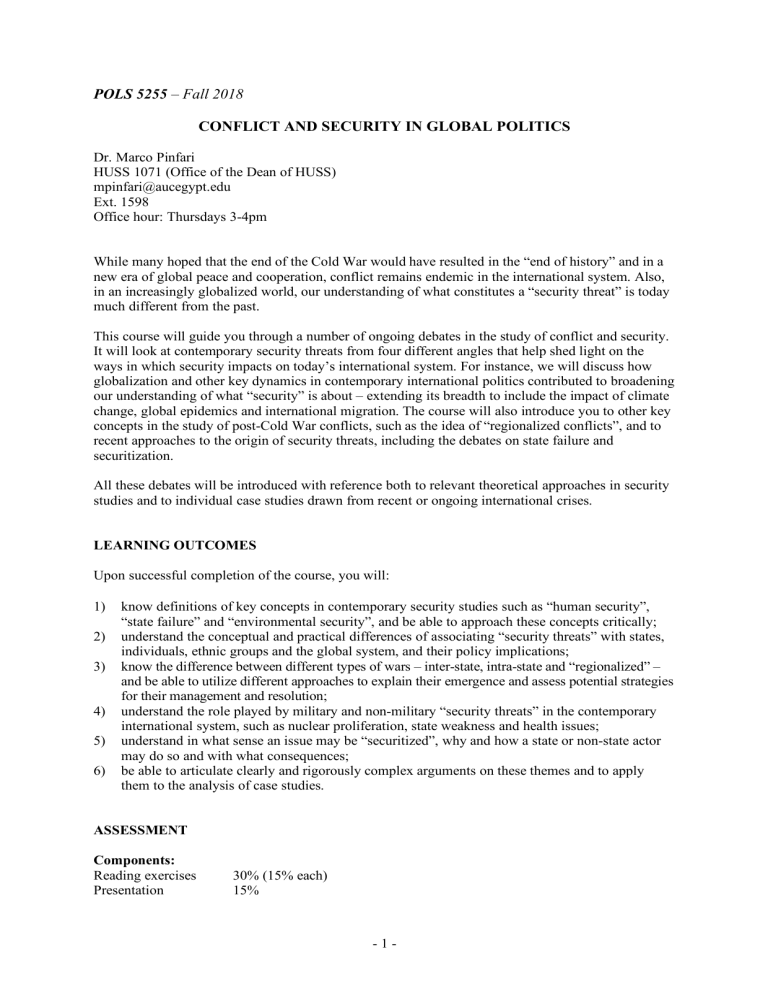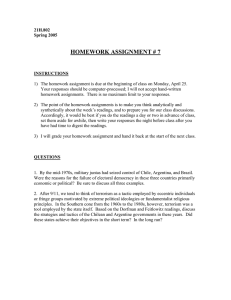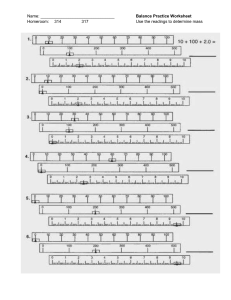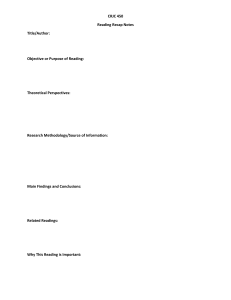
POLS 5255 – Fall 2018 CONFLICT AND SECURITY IN GLOBAL POLITICS Dr. Marco Pinfari HUSS 1071 (Office of the Dean of HUSS) mpinfari@aucegypt.edu Ext. 1598 Office hour: Thursdays 3-4pm While many hoped that the end of the Cold War would have resulted in the “end of history” and in a new era of global peace and cooperation, conflict remains endemic in the international system. Also, in an increasingly globalized world, our understanding of what constitutes a “security threat” is today much different from the past. This course will guide you through a number of ongoing debates in the study of conflict and security. It will look at contemporary security threats from four different angles that help shed light on the ways in which security impacts on today’s international system. For instance, we will discuss how globalization and other key dynamics in contemporary international politics contributed to broadening our understanding of what “security” is about – extending its breadth to include the impact of climate change, global epidemics and international migration. The course will also introduce you to other key concepts in the study of post-Cold War conflicts, such as the idea of “regionalized conflicts”, and to recent approaches to the origin of security threats, including the debates on state failure and securitization. All these debates will be introduced with reference both to relevant theoretical approaches in security studies and to individual case studies drawn from recent or ongoing international crises. LEARNING OUTCOMES Upon successful completion of the course, you will: 1) 2) 3) 4) 5) 6) know definitions of key concepts in contemporary security studies such as “human security”, “state failure” and “environmental security”, and be able to approach these concepts critically; understand the conceptual and practical differences of associating “security threats” with states, individuals, ethnic groups and the global system, and their policy implications; know the difference between different types of wars – inter-state, intra-state and “regionalized” – and be able to utilize different approaches to explain their emergence and assess potential strategies for their management and resolution; understand the role played by military and non-military “security threats” in the contemporary international system, such as nuclear proliferation, state weakness and health issues; understand in what sense an issue may be “securitized”, why and how a state or non-state actor may do so and with what consequences; be able to articulate clearly and rigorously complex arguments on these themes and to apply them to the analysis of case studies. ASSESSMENT Components: Reading exercises Presentation 30% (15% each) 15% -1- Research paper Final exam 35% (30% paper; 5% outline) 20% Reading exercises: students are expected to submit two short reading exercises throughout the term. Each is worth 15% of the final mark (30% overall). Students will be asked to choose ONE reading (essential or recommended) among those listed in relation to specific modules. You should then write a short paper (between 700 and 1000 words) with the following task: “Consider one ongoing conflict of your choice. What are the aspects of this conflict that this reading helps you understand better? In your view, what aspects of this conflict are not (or cannot) be effectively understood through the approach of this reading?” These short papers are on: - Readings from either module 2 or 3 (due on Tuesday 25 September) - Readings from either module 4 or 5 (due on Tuesday 16 October) You are NOT allowed to write your reading exercise papers on your presentation modules. Late submissions are not allowed except in case of documented health or family emergencies. Class presentation: students will be required to deliver one 15’ presentation on one of the course modules. A list of presentation tasks will be made available at the beginning of the course; presentations will be assigned on a first-come, first-served basis. Presenters must answer the presentation question or task for that module using the essential reading AND at least TWO recommended readings for that module, which should be referenced appropriately in the presentation. Students are normally expected to work independently but can request the assistance of the course instructor. Presenters MUST submit to the instructor a short draft/outline of their presentation TWO days before the relevant class – that is, normally by Friday evening for the regular Sunday sessions. Presenters who fail to submit such outline will automatically lose 20% of the mark for the presentation. Answering questions different from those specified in the presentation list is NOT allowed, since tasks are designed to fit in with the other parts of the module (instructor’s presentation and activity); however, most questions allow the presenter to work on case studies of her/his own choice. Presentations will be assessed on the basis of the quality of their argument, their structure, and their delivery. Final exam: a take-home exam will be taken in the exam week at the end of the course covering modules 2 to 13. Students will be asked to answer, in 24 hours, some short open question focusing on cross-cutting themes related to these modules. Research paper: a research paper must be submitted by Sunday 1 December. The length of the paper must be 3,000 words (plus or minus 10%). You will be expected to suggest your own question, which MUST be related to one of the modules of the course (but different from the presentation question on that module) and which must be developed with reference to at least TWO case studies. You may write the paper on the same broad topic as your class presentation (e.g. nuclear proliferation; health; etc.) but both the research question and the case studies must be different from those of your class presentation. A research presentation session will be held between in class 9 (scheduled on Thursday 8 November) to allow all students to present their ideas for the essay topic and receive early feedback from the instructor and colleagues. You MUST then submit by Monday 12 November an outline of your paper which should briefly introduce: a) the theme/topic of the paper; b) its main research question; c) its methodology (which theories will be used? Why? Which case studies have you selected? Why?); d) a provisional bibliography. The outline will be marked by the instructor and will be worth 5% of the final mark of the course. The outline must be between 500- and 1000-words long. -2- The final paper must include at least 8 academic references (journal articles, chapters in edited books, academic books, etc.) on the top of any essential course reading. These eight references may include some of the recommended readings included in the syllabus. The penalty for late assignments is 5 per cent per day, including weekends. The first page of each paper must include the student’s name and ID number, and the essay body must be 12-point font, double-spaced and include page numbers. The essay must also include a bibliography and acknowledge sources appropriately; both Harvard and Chicago styles are acceptable. Please refer to the following websites for guidance: http://libweb.anglia.ac.uk/referencing/harvard.htm (Harvard) http://www.chicagomanualofstyle.org (Chicago) Grade scale: Letter grade A AB+ B Percentage 93+ 90-92 87-89 83-86 Letter grade BC+ C F Percentage 80-82 77-79 70-76 Below 70 ATTENDANCE POLICY AND BEHAVIOR IN CLASS No attendance mark is assigned in this course. However, the following policies will be STRICTLY adhered to: Students are expected to attend the seminars (including rescheduled ones and/or those taking place in days other than Sundays) AND take part regularly in class discussions, showing knowledge of – and engagement with – the essential readings. Students who are physically present in class but are unable or unwilling to contribute to the class discussions, or are busy in other activities (for instance by making repeated use of their mobile devices during the session), will be considered as absent. Students who, without a valid justification, arrive to class more than 10’ late, leave more than 10’ early or leave the teaching room repeatedly during the session will be considered as absent. Students unable to attend class for justifiable reasons should contact the instructor ideally before class, and in any case no later than seven days after the missed class. Only serious and documented family or health emergencies and documented participation in formal AUC activities will be accepted as valid justifications. The procedure for correct documentation of such absences is outlined in the university-wide attendance policy. Unexcused absence in at least THREE sessions, and absence with or without valid justification in at least FIVE sessions, will result in an automatic “F” grade. Based on the current university-wide attendance policy, if the five-session limit is reached because of absences caused by serious family and health emergencies or participation in formal AUC activities, the student may petition to drop their course after the formal deadline to drop courses and before the deadline for withdrawal from the university, or may petition to continue the course. If an attendance sheet is circulated in class, each student is expected to sign only for him-/herself. Falsifying signatures is considered by AUC as a breach of academic integrity and the students involved in this practice will be immediately referred to the AUC Academic Integrity Committee. BLENDED LEARNING You must register as soon as possible on the Blackboard portal of the course, in which you will find: - A pdf copy of this syllabus -3- - Access to the essential and recommended course readings - Printouts of lecture slides that will be uploaded after the relevant lecture Blackboard will also be used to deliver any urgent or non-urgent notice to the class. Even if these notices are normally also forwarded to your email address, it is possible that you do not receive some of these (for instance if they go to your “spam” folder) so you must check the Blackboard portal at least weekly to keep yourself updated. Finally, even if all the sessions of this course are currently scheduled to take place on campus, if for any reason they cannot be held on campus they will be held online on “Blackboard Collaborate”. Depending on the circumstances, this change may take place at very short notice. ACADEMIC INTEGRITY Teaching is based on a relation of mutual trust between the teacher and the students. As a teacher I take my academic responsibilities very seriously and I expect all my students to do the same. I expect all students to be familiar with the AUC code of practice on academic integrity which is available at: http://in.aucegypt.edu/auc-academics/academic-integrity/academic-integrity-students Please pay particular attention to the regulations on plagiarism, collaborative work and falsification of signatures. The assignments will be checked through Turnitin; course code and password will be made available to attending students in due course. Students will be allowed to self-check for plagiarism early drafts of their work and only the final submission will be checked by the instructor. All breaches of the code of practice will be acted upon promptly and firmly, resulting at least in zero marks for the relevant piece of assessment and possibly in further action being taken by the instructor, depending on the severity of the offense. This includes the referral to the AUC. If in doubt as to what constitutes plagiarism, do not hesitate to contact the instructor. ACADEMIC FREEDOM AND INTELLECTUAL INTERACTION In this course you will deal with a number of topics that are often controversial. You are free to offer the class any disagreement you may have with the readings or lecture. You will NOT be penalised for disagreeing with other students, the readings or the instructor, but your perspective must be based on documentable evidence from the course or other readings. Freedom of speech and ideas is a basic principle of academic life (and of universal human rights) and every student will have a chance to express her/his opinion as long as it is voiced in a respectful manner. However, varied points of view must be expressed in a manner that is sensitive to differences in abilities, ethnicity, religion, gender and lifestyle, and should not be expressed so as to be perceived as a personal attack. In short, respect for others’ differences is one of the most important prerequisites for us working together in this course. STUDENTS WITH DISABILITIES If you believe you have a disability that impacts on your study, or have a documented disability that requires modified instructional procedures, please contact the instructor as soon as possible. The instructor is happy to hear from you even if you do not have a formal proof of your disability; however, you may be asked to provide a note from the AUC Disability Services (http://in.aucegypt.edu/student-life/student-well-being/disability-services) when your condition requires substantial adjustments (e.g. to the structure of the exams etc.). -4- TEXTBOOKS There is no single textbook for this course. The essential and recommended readings for each module are listed below and can be accessed through the Blackboard portal of the course. COURSE SCHEDULE 1) Introduction (I) Object of threats 2) 3) 4) 5) The state: war and the modern nation-state The individual: human security Sub-state level: ethnic groups The global system: climate change and “environmental security” (II) Origin of threats 6) 7) 8) External threats: great powers and hegemonic war Internal threats: civil wars and greed “Bad neighborhoods”: regional conflict and intervention [mid-term exam] 9) Presentation of essay topics (III) Types of threats 10) 11) 12) Force: nuclear power and proliferation Institutional weakness: “state failure” and the post-colonial state Health and disease (IV) Constructing threats 13) 14) Terrorism Migration A course schedule and a presentation schedule will be made available on Blackboard. They will include the provisional dates for each of the sessions above. COURSE READINGS 1 – Introduction Recommended reading Buzan, B. – Hansen, L. (2009). The Evolution of International Security Studies (Cambridge: Cambridge University Press), chapter one “Defining International Security Studies”, pp. 8-20. 2 – The state: war and the modern nation-state Essential reading Levy, J.S. (1988). Domestic Politics and War. Journal of Interdisciplinary History, 18(4), 653-673. Recommended readings Tilly, C. (1992) Coercion, Capital and European States AD 990-1990 (Oxford: Blackwell), chapter one “Cities and States in World History”, 1-37. Bean, R. (1973). War and the Birth of the Nation State. The Journal of Economic History, 33(1), 203221. Coker, C. (1998) Post-modern War. The RUSI Journal, 143(3), 7-14. -5- Luttwak, E.N. (1995). Toward Post-Heroic Warfare, Foreign Affairs, 74(3), 109-122. Latham, A. (2002). Warfare Transformed: A Braudelian Perspective on the ‘Revolution in Military Affairs’. European Journal of International Relations, 8(2), 231-266. Singer, P.W. (2005) Outsourcing War. Foreign Affairs, 84(2), 119-132. 3 – The individual: human security Essential reading Christie, R. (2010). Critical Voices to Human Security: To Endure, To Engage or To Critique? Security Dialogue, 41(2): 169-190. Recommended readings Various authors (2004). Special section: What is ‘Human Security”? Security Dialogue 35(3): 345372. Owen, T. (2004). Human Security – Conflict, Critique and Consensus: Colloquium Remarks and a Proposal for a Threshold-Based Definition. Security Dialogue 35(3): 373-387. Paris, R. (2001). Human Security: Paradigm Shift or Hot Air? International Security, 26(2): 87-102. Bajpai, K. (2000). Human Security: Concept and Measurement. Kroc Institute Occasional Paper No. 19:OP:1. Hudson, H. (2018). Larger than Life? Decolonising Human Security Studies through Feminist Posthumanism. Strategic Review for Southern Africa, 40(1): 46-62. Vankovska, B. (2007). The Human Security Doctrine for Europe: A View from Below. International Peacekeeping 14(2): 264-281. King, G. – Murray, C.J.L. (2001-2). Rethinking Human Security. Political Science Quarterly, 116(4): 585-610. 4 - Sub-state level: ethnic groups Essential reading Hug, S. (2013). The Use and Misuse of the ‘Minorities at Risk’ Project. Annual Review of Political Science, 16, 191-208. Recommended readings Gurr, T.R. (1993). Why Minorities Rebel: A Global Analysis of Communal Mobilization and Conflict Since 1945. International Political Science Review, 14(2): 161-201. Birnir, J.K. et al. (2018). Introducing the AMAR (All Minorities at Risk) Data. Journal of Conflict Resolution, 62(1): 203-226. Cederman, L.E. – Wimmer, A. – Min, B. (2010). Why Do Ethnic Groups Rebel? New Data and Analysis. World Politics 62(1): 87-119. Cederman, L.E – Gleditsch, K.S. – Wucherpfennig, J. (2017). Predicting the Decline of Ethnic Civil War: Was Gurr Right and for the Right Reasons? Journal of Peace Research 54(2): 262-274. Hale, H.E. (2017). Focus on the Fundamentals: Reflections on the State of Ethnic Conflict Studies. Ethnopolitics, 16(1): 41-47. Fearon, J.D. – Kasara, K. – Laitin, D.D. (2007). Ethnic Minority Rule and Civil War Onset. American Political Science Review, 101(1): 187-193. Basedau, M. et al. (2017). Does Discrimination Breed Grievances – and Do Grievances Breed Violence? New Evidence from an Analysis of Religious Minorites in Developing Countries. Conflict Management and Peace Science, 34(4): 217-239. Kalyvas, S.N. (2008). Ethnic Defection in Civil War. Comparative Political Studies, 41(8): 10431068. -6- 5 - The global system: climate change and “environmental security” Essential reading Homer-Dixon, T.F. (1994). Environmental Scarcities and Violent Conflict: Evidence from Cases. International Security, 19(1): 5-40. Recommended readings Barnett, J. (2003). Security and Climate Change. Global Environmental Change, 1(3): 7-17. Scheffran, J. – Battaglini, A. (2011). Climate and Conflicts: The Security Risks of Global Warming. Regional Environmental Change,. 11: S27-S39. Selby, J. et al. (2017). “Climate Change and the Syrian Civil War Revisited”, Political Geography, Sussex Research Online. Tertrais, B. (2011). The Climate Wars Myth. The Washington Quarterly, 34(3): 17-39. Gleditsch, N.P. – Furlong, K. – Hegre, H. – Lacina, B. – Owen, T. (2006). Conflicts over Shared Rivers: Resource Scarcity or Fuzzy Boundaries? Political Geography 25: 361-382. Zeitoun, M. – Warner J. (2006). Hydro-hegemony – A Framework for Analysis of Trans-Boundary Water conflicts. Water Policy, 8: 435-460. Brown, O. – Hammill, A. – Mcleman, R. (2007). Climate Change as the ‘New’ Security Threat: Implications for Africa. International Affairs, 83(6): 1141-1154. 6 - External threats: great powers and hegemonic war Essential reading Gilpin, R. (1988). The Theory of Hegemonic War. The Journal of Interdisciplinary History, 18(4): 591-613. Recommended readings Young, A.R. (2010). Perspectives on the Changing Global Distribution of Power: Concepts and Context. Politics, 30(S1): 2-14. Friedberg, A.L. (2005). The Future of U.S.-China Relations: Is Conflict Inevitable? International Security, 30(2): 7-45. Haass, R.N. (2008). The Age of Nonpolarity: What Will Follow U.S. Dominance. Foreign Affairs, 87(3): 44-56. Ross, R.S. (2006). Balance of Power Politics and the Rise of China: Accommodation and Balancing in East Asia. Security Studies, 15(3): 355-395. Layne, C. (2009). The Waning of U.S. Hegemony – Myth or Reality? A Review Essay. International Security, 34(1): 147-172. Tammen, R.L. – Kugler, J. (2006). Power Transition and China-US Conflicts. Chinese Journal of International Politics, 1:35-55. 7 – Internal threats: civil wars and greed Essential reading Ross, M.L. (2004). How Do Natural Resources Influence Civil War? Evidence from Thirteen Cases. International Organization, 58(1): 35-67. Recommended readings Fearon, J.D. (2004). Why Do Some Civil Wars Last So Much Longer Than Others? Journal of Peace Research, 41(3): 275-301. Le Billon, P. (2001). The Political Ecology of War: Natural Resources and Armed Conflict. Political Geography, 20: 561-584. Kaldor, M. (1999). New and Old Wars: Organised Violence in a Global Era (London: Polity Press), chapter one “Introduction”, 1-12. Mello, P.A. (2010). In Search of New Wars: The Debate about a Transformation of War. European Journal of International Relations, 16(2): 297-309. -7- Collier, P. – Hoeffler. A. (2004). Greed and Grievance in Civil War. Oxford Economic Papers 56: 563-595. Keen, D. (2000). Incentives and Disincentives for Violence. In M. Berdal, D.M. Malone (eds.) Greed and Grievance: Economic Agendas in Civil Wars (Boulder: Lynne Rienner), 19-41. 8 - “Bad neighborhoods”: regional conflict and intervention Essential reading Gleditsch, K.S. (2007). Transnational Dimensions of Civil War. Journal of Peace Research, 44(3): 293-309. Recommended readings Frazier, D. – Stewart-Ingersoll, R. (2010). Regional Powers and Security: A Framework for Understanding Order within Regional Security Complexes. European Journal of International Relations, 16(4): 731-753. Tavares, R. (2008). Understanding Regional Peace and Security: A Framework for Analysis. Contemporary Politics, 14(2): 107-127. Weiner, M. (1996). Bad Neighbors, Bad Neighborhoods: An Inquiry into the Causes of Refugee Flows. International Security, 21(1): 5-42. Scorgie, L. (2013). Prominent Peripheries: The Role of Borderlands in Central Africa’s Regionalized Conflict. Critical African Studies, 5(1): 32-47. Kathman, J.D. (2011). Civil War Diffusion and Regional Motivations for Intervention. Journal of Conflict Resolution, 55(6): 847-876. Buzan. B. – Waever, O. (2003). Regions and Powers: The Structure of International Security (Cambridge: Cambridge University Press), chapter seven “The Middle East: A Perennial Conflict Formation”, 187-218. Leenders, R. (2007). ‘Regional Conflict Formations’: Is the Middle East Next? Third World Quarterly, 28(5): 959-982. 9 – Presentation of essay topics (no readings) 10 – Force: nuclear power and proliferation Essential reading Sagan, S.D. (2011). The Causes of Nuclear Weapons Proliferation. Annual Review of Political Science, 14: 225-244. Recommended readings Sagan, S.D. – Waltz, K.N. (2002). The Spread of Nuclear Weapons: A Debate Renewed (New York; London: W.W. Norton), chapter one “More May Be Better”; chapter two “More Will Be Worse”, 3-87. Jo, D.J. – Gartzke, E. (2007). Determinants of Nuclear Weapons Proliferation. Journal of Conflict Resolution, 51(1): 167-194. Potter, W.C. (2010). The NPT and the Sources of Nuclear Restraint. Daedalus, 139(1): 68-81. Fuhrmann, M. (2009). Spreading Temptation: Proliferation and Peaceful Nuclear Cooperation Agreements. International Security, 34(1): 7-41. Kroenig, M. (2009). Importing the Bomb: Sensitive Nuclear Assistance and Nuclear Proliferation. Journal of Conflict Resolution, 53(2): 161-180. Miller, S.E. – Sagan, S.D. (2009). Nuclear Power Without Nuclear Proliferation? Daedalus 138(4): 718. -8- 11 - Institutional weakness: “state failure” and the post-colonial state Essential reading Nay, O. (2013). Fragile and Failed States” Critical Perspectives on Conceptual Hybrids. International Political Science Review, 34(3): 326-341. Recommended readings Call, C.T. (2008). The Fallacy of the ‘Failed State’. Third World Quarterly, 29(8): 1491-1507. Milliken, J. – Krause, K. (2002). State Failure, State Collapse, and State Reconstruction: Concepts, Lessons and Strategies. Development and Change, 33(5): 753-774. Bates, R.H. (2008). State Failure. Annual Review of Political Science, 11: 1-12. Barkawi, T. – Laffey, M. (2006). The Postcolonial Moment in Security Studies. Review of International Studies, 32: 329-352. Rotberg, R.I. (2002). The New Nature of Nation-State Failure, The Washington Quarterly, 25(3): 8596. Newman, E. (2009). Failed States and International Order: Constructing a Post-Westphalian World. Contemporary Security Policy, 30(3): 421-443. Di John, J. (2008) Conceptualising the Causes and Consequences of Failed States: A Critical Review of the Literature. LSE Crisis States Research Centre Working Papers, No. 25. 12 – Health and disease Essential reading McInnes, C. – Lee, K. (2006). Health, Security and Foreign Policy. Review of International Studies, 32: 5-23. Recommended readings Szinicz, L. (2005). History of Chemical and Biological Warfare Agents. Toxicology 214:167-181. Novotny, T.E. (2007-8). Global Governance and Public Health Security in the 21st Century. California Western International Law Journal, 38: 19-40. Hoffman, S.J. (2010). The Evolution, Etiology and Eventualities of the Global Health Security Regime. Health Policy and Planning, 25: 510-522. Fidler, D.P. (2005). From International Sanitary Conventions to Global Health Security: The New International Health Regulations. Chinese Journal of International Law, 4(2): 325-392. Prins, G. (2004). AIDS and Global Security. International Affairs, 80(5): 931-952. Elbe, S. (2006). Should HIV/AIDS Be Securitized? The Ethical Dilemmas of Linking HIV/AIDS and Security. International Studies Quarterly, 50: 119-144. Wilkinson, A. – Leach, M. (2015). Briefing: Ebola – Myths, Realities, and Structural Violence. African Affairs, 114(454): 136-148. 13 – Terrorism Essential reading Mabee, B. (2007). Re-Imagining the Borders of US Security after 9/11: Securitisation, Risk, and the Creation of the Department of Homeland Security. Globalizations, 4(3): 385-397. Recommended readings Williams, M.C. (2003). Words, Images, Enemies: Securitization and International Politics. International Studies Quarterly, 47: 511-531. Pokalova, E. (2010). Framing Separatism as Terrorism: Lessons from Kosovo. Studies in Conflict and Terrorism, 33: 429-447. Finlay, C.J. (2009). How to Do Things with the Word ‘Terrorist’. Review of International Studies, 35: 751-774. Jackson, R. (2007). Constructing Enemies: ‘Islamic Terrorism’ in Political and Academic Discourse. Government and Opposition, 42(3): 394-426. -9- Oswald, D.L. (2005). Understanding Anti-Arab Reactions Post-9/11: The Role of Threats, Social Categories, and Personal Ideologies. Journal of Applied Social Psychology, 35(9): 1775-1799. Powell, K.A. (2011). Framing Islam: An Analysis of U.S. Media Coverage of Terrorism Since 9/11. Communication Studies, 62(1): 90-112. Dexter, H. (2012). Terrorism and Violence: Another Violence Is Possible? Critical Studies on Terrorism, 5(1): 121-137. Pinfari, M. (2017). Framing through Paradox: Egypt and the “Obama Supports Terrorism” Campaign, Studies in Conflict and Terrorism, 40(2): 122-138. 14 – Migration Essential reading Watson, S.D. (2007). Manufacturing Threats: Asylum Seekers as Threats or Refugees? Journal of International Law and International Relations, 3(1): 95-117. Recommended readings Holmes, S.M. – Castañeda, H. (2016). Representing the “European Refugee Crisis” in Germany and Beyond: Deservingness and Difference, Life and Death”. American Ethnologist, 43(1): 12-24. Lazaridis, G. – Skleparis, D. (2016). Securitization of Migration and the Far Right: The Case of Greek Security Professionals. International Migration, 54(2): 176-192. Brouwer, J. – van der Woude, M. – van der Leun, J. (2017). Framing Migration and the Process of Crimmigation: A Systematic Analysis of the Media Representation of Unauthorized Immigrants in the Netherlands. European Journal of Criminology 14(1): 100-119. Ibrahim. M. (2005). The Securitization of Migration: A Racial Discourse. International Migration, 43(4): 163-186. Nadig, A. (2002). Human Smuggling, National Security, and Refugee Protection. Journal of Refugee Studies, 15(1): 1-25. Dauvergne, C. (2007). Security and Migration Law in the Less Brave New World. Social & Legal Studies, 16(4): 533-549. Huysmans, J. (2000). The European Union and the Securitization of Migration. Journal of Common Market Studies, 38(5): 751-777. Muller, B.J. (2004). (Dis)qualified Bodies: Securitization, Citizenship and ‘Identity Management’. Citizenship Studies, 8(3): 279-294. OTHER RESOURCES The main scholarly journals in the field of security studies include International Security, Security Dialogue, Strategic Studies, and the Journal of Conflict Resolution. Other journals that publish cutting-edge studies in this and other closely-related fields include the Journal of Peace Studies, Studies in Conflict and Terrorism, Terrorism and Political Violence, International Organization, International Studies Quarterly, Third World Quarterly, Review of International Studies, European Journal of International Relations, Millennium, and Ethics and International Affairs. Students are encouraged to become familiar with these journals, especially to understand the characteristics of a “good” academic paper in this discipline, but should by all means extend their bibliographic search to other academic journals listed in the AUC e-journal search engine on the basis of their own personal interests. Feel free to contact the course instructor if you require personalized guidance. - 10 -




